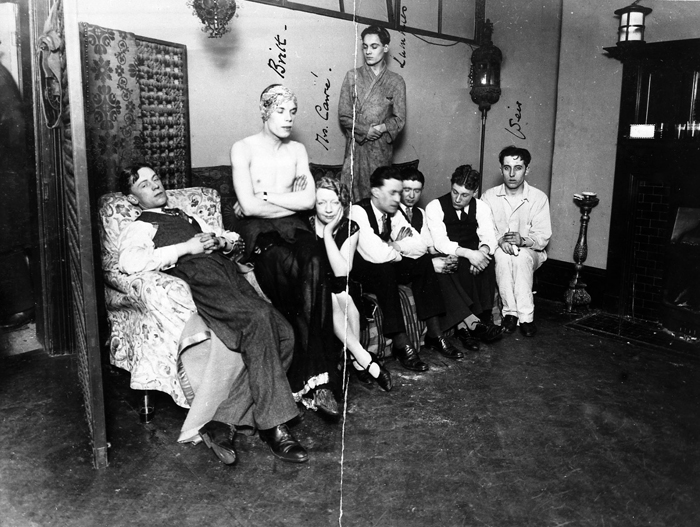Disorderly house on:
[Wikipedia]
[Google]
[Amazon]
 In
In
Sunday Observance Act 1780
/ref> Both acts have been repealed in the UK.
 In
In English
English usually refers to:
* English language
* English people
English may also refer to:
Peoples, culture, and language
* ''English'', an adjective for something of, from, or related to England
** English national ide ...
criminal law a disorderly house is a house in which the conduct of its inhabitants is such as to become a public nuisance
Nuisance (from archaic ''nocence'', through Fr. ''noisance'', ''nuisance'', from Lat. ''nocere'', "to hurt") is a common law tort. It means that which causes offence, annoyance, trouble or injury. A nuisance can be either public (also "common") ...
, or outrages public decency, or tends to corrupt or deprave, or injures the public interest; or a house where persons congregate to the probable disturbance of the public peace or other commission of crime. To persistently or habitually keep a disorderly house is an offence against the common law, punishable by fine or imprisonment.
The usual charge for keeping a brothel where prostitution can be proven, for instance, is under section 33A of the Sexual Offences Act 1956
The Sexual Offences Act 1956 (4 & 5 Eliz.2 c.69) is an Act of the Parliament of the United Kingdom that consolidated the English criminal law relating to sexual offences between 1957 and 2004. It was mostly repealed (from 1 May 2004) by the Sex ...
, "Keeping a Brothel for Prostitution", and the penalty is up to six months if proceeding summarily or seven years if by indictment. (The definition of a brothel in English law has been held to be "a place where people of opposite sexes are allowed to resort for illicit intercourse, whether…common prostitutes or not" and thus prostitution need not form part of the picture; a soapland
Prostitution, as defined under modern Japanese law, is the illegal practice of sexual intercourse with an 'unspecified' (unacquainted) person in exchange for monetary compensation, which was criminalised in 1956 by the introduction of article 3 o ...
is, in the eyes of the law of England, a brothel without prostitution.) Brothel-keeping can, however, also be charged as "Keeping a Disorderly House" (contrary to the common law rather than any written statute), and is then punishable by an unlimited fine, and unlimited imprisonment.
The "operator" of a crack house or opium den
An opium den was an establishment in which opium was sold and smoked. Opium dens were prevalent in many parts of the world in the 19th century, most notably China, Southeast Asia, North America, and France. Throughout the West, opium dens were fr ...
can also be charged with keeping a disorderly house, as can the owner/operator of an illegal gambling establishment, as well as the owner of a speakeasy
A speakeasy, also called a blind pig or blind tiger, is an illicit establishment that sells alcoholic beverages, or a retro style bar that replicates aspects of historical speakeasies.
Speakeasy bars came into prominence in the United States ...
, "blind tiger", or "boozecan" (illegal bar or pub). Modern vice laws, regulating such things as drinking, gambling, dancing, and drugs, have resulted in calls for the offence of keeping a disorderly house to be abolished.
As brothel-keeping is one of the most common causes for the charge of keeping a disorderly house, "disorderly house" has become something of a euphemism for brothel in the English legal community; brothel or "disorderly house"-related ''statutory'' offences can be found under sections 33 to 36 of the Sexual Offences Act 1956
The Sexual Offences Act 1956 (4 & 5 Eliz.2 c.69) is an Act of the Parliament of the United Kingdom that consolidated the English criminal law relating to sexual offences between 1957 and 2004. It was mostly repealed (from 1 May 2004) by the Sex ...
. These are, however, not to be confused with the ''common-law'' offence of Keeping A Disorderly House.
History
There were formerly statutory provisions relating to disorderly houses under: *the Disorderly Houses Act 1751. *sections 1 and 2 of the Sunday Observance Act 1780./ref> Both acts have been repealed in the UK.
See also
*Opium den
An opium den was an establishment in which opium was sold and smoked. Opium dens were prevalent in many parts of the world in the 19th century, most notably China, Southeast Asia, North America, and France. Throughout the West, opium dens were fr ...
* Crack house
References
{{reflistFurther reading
* Archbold Criminal Pleading, Evidence and Practice (2008) 20-246 to 20-251 English criminal law Obscenity law